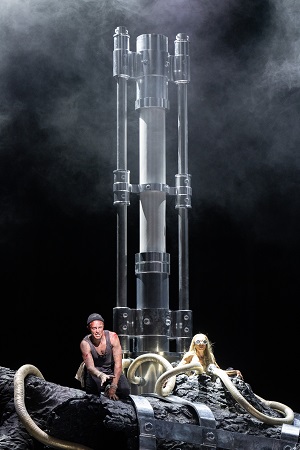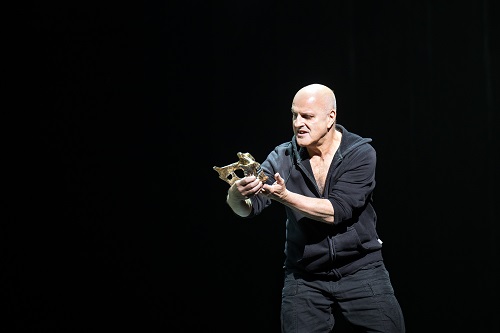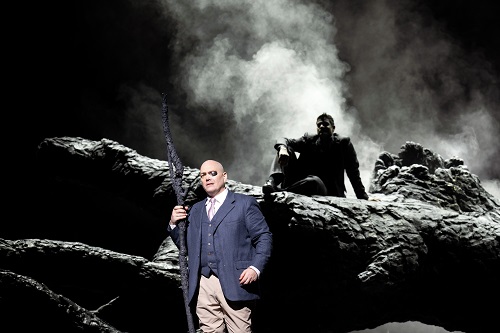One might argue with Covent Garden’s pre-publicity claim that this Rheingold is‘a bold new imagining’, but this first collaboration between director Barrie Kosky and conductor Anthony Pappano brings a wonderfully fertile partnership that held me in its grip throughout its 150 minutes. This new production, the first at the Royal Opera House for nearly 20 years, confirms Kosky’s credentials as a seasoned Wagnerian whose experience until now has been acquired in Germany variously at the Staatsoper Hannover, Bayreuth and Berlin’s Komishe Oper. But he’s also a director with form in the UK – his 2018 Carmen at this address brought mixed reactions, while his Dialogues des Carmélites at Glyndebourne earlier this summer has been much admired. Whether radical or provocative, Kosky probes new ideas, creates fresh insights and rarely follows a conventional path.
This first instalment of Wagner’s entire Ring cycle, to be completed in 2027, dispenses with any mythical Nordic landscape. There are no watery scenes evoking the Rhine, nor do we encounter videoed images of Valhalla. Instead, this Rheingold opts for a more stripped-down approach and is neatly devised by set designer Rufus Didwiszus. Dominating each scene are the ruins of the ‘world ash tree’ sprawled across the stage like a helpless beast, its outstretched lower trunk seemingly grasping for survival. From its gnarled body the Rhinemaidens emerge to tease Alberich, while liquid gold leaks from a sewer-like opening in its flank. By the time we reach the subterranean Nibelheim, a Heath Robinson style steam machine (though nothing remotely cartoonish) pumps gold from the tree’s roots to project an utterly monstrous image. It’s clear this production is an unambiguous warning about mankind’s destructive powers and a cri de coeur towards the violation of our world’s natural resources.

Silently observing these events, and arguably Kosky’s finest interpretative moment, is the figure of the Earth goddess Erda – a frail old woman, entirely naked, whose compelling performance is taken on opening night by the 82-year-old model Rose Knox-Peebles. Even before the first stirrings of the Rhine music, she appears as a haunting presence creeping across the bare stage as if in a reverie, a gesture of despair as she hides her face in her hands as she sees or recollects the world’s desecration. Is she dreaming or reminiscing? Kosky explained in the souvenir programme that he ‘wanted to explore the idea that we are watching the dreams and hallucinations and visions of Mother Earth’. With his comment that Erda is ‘dreaming our story’, this Rheingold is no longer merely a mythological tale concerning power and love, betrayal and greed, but becomes a more personal narrative. Whatever Kosky’s intention, the use of a mainly mute Erda is a striking conceit. Wiebke Lehmkuhl sings the designated role offstage with great distinction while simultaneously the silent Erda wraps herself around Wotan in a plea for him to surrender the ring torn earlier from Alberich’s finger.

This is one of several visually arresting moments. Others include the deformed heads of the child slave workers transporting buckets of gold, the Goldfinger-like immersion of Freia in a tin bath as payment to the Giants and, in the final scene, the overlong confetti rainbow indicating the God’s arrival at Valhalla. I found this surfeit of glitter over grandeur overdone, when surely the music conjures something stately. Not was I entirely convinced about the polo party scene where a lavish picnic is laid out for Wotan’s family all curiously dressed in Edwardian attire by Victoria Behr. That said, it brings a lighter touch before the giants kidnap Freia.
Designs and costumes aside, what really lifts this Rheingold is the standard of acting and singing, with many of the cast new to their roles. Each performance is vividly projected with a star turn coming from Christopher Maltman as an urbane and sonorous Wotan. Until recently associated as a lieder singer, he has acquired considerable power and authority necessary for this role. Christopher Purves as Alberich is no less persuasive vocally, and despite his single-minded ambition and warmth of tone he contrives, albeit unwittingly, to sound almost amiable. Throughout his humiliations at the hand of the Rhinemaidens and then Wotan, one cannot help feeling some sympathy for him. Sean Panikkar’s cackling Loge grows in stature, and he makes the most of the stage with his pirouetting to create a truly unsettling character.

Elsewhere, Brenton Ryan’s grumbling Mime, Marina Prudenskaya’s haughty Fricka and Kiandra Howarth’s anxious Freia are vividly portrayed and all sing with lustrous tone. Strong impressions are also created by Insung Kim’s Fasolt and Soloman Howard’s Fafner, while Kostas Smoriginas (Donner) and Rodrick Dixon (Froh) are equally assured. So too are the well-balanced trio of Rhinemaidens: Katharina Konradi, Niamh O’Sullivan and Marvic Monreal. In the pit Antonio Pappano creates an impressive ebb and flow in his handling of the score, maintaining an ideal balance and coaxing fine playing from the players of the Royal Opera House. Both this initial performance and production bodes well for the rest of the cycle.
David Truslove
Wotan – Christopher Maltman, Fricka – Marina Prudenskaya, Loge – Sean Panikkar, Donner – Kostas Smoriginas, Froh – Rodrick Dixon, Freia – Kiandra Howarth, Erda – Rose Knox-Peebles & Wiebke Lehmkuhl, Fasolt – Insung Kim, Fafner – Soloman Howard, Alberich – Christopher Purves, Mime – Brenton Ryan, Woglinde – Katharina Konradi, Wellgunde – Niamph O’Sullivan, Flosshilde – Marvic Monreal; Director – Barrie Kosky, Conductor –Antonio Pappano, Designer – Rufus Didwiszus, Costumes – Victoria Behr, Lighting – Alessandro Carletti, Orchestra of the Royal Opera House.
Royal House Opera, Covent Garden, London; Monday 11th September 2023.
ABOVE: Das Rheingold © 2023 ROH/Monika Rittershaus